The Truth That Outlived Him
New Epstein files, survivor testimonies, and a legacy larger than any cover-up.
📌 NOTE FOR NEW READERS:
The 50501 Movement organizes peaceful action across all 50 states to defend democracy. 80,000+ subscribers strong and growing. If this resonates with you, hit subscribe and join us.
TL;DR:
House Democrats released emails showing Epstein calling Trump “the dog that hasn’t barked” while discussing a victim who “spent hours at my house with him”
Virginia Giuffre, whose courage sent Epstein and Maxwell to prison. Her memoir Nobody’s Girl was just published in October
Discharge petition reaches 218 signatures this week, forcing December vote on releasing complete DOJ files
Maria Farmer reported Epstein to FBI in 1996; authorities ignored her, allowing decades more abuse
Her Name Was Virginia Giuffre
Virginia Roberts Giuffre.
She was 16 when Ghislaine Maxwell approached her at Mar-a-Lago, where Virginia worked as a spa attendant while her father maintained the grounds. Maxwell told her she could train to be a masseuse so she could make good money and see the world.
Virginia had already survived childhood sexual abuse. She’d previously run away. She was rebuilding herself, so when a sophisticated older woman offered her a path forward, she took it.
Ghislaine Maxwell delivered Virginia into Jeffrey Epstein’s trafficking operation.
And Virginia wasn’t the first.
That distinction belongs to Maria Farmer, a promising young artist who reported Epstein and Maxwell to the FBI and NYPD in 1996, years before Virginia’s abuse even began. Maria’s sister Annie, just 16 at the time, was also assaulted at Epstein’s New Mexico ranch. Both sisters tried to warn authorities but both were ignored.
And Virginia wouldn’t be the last. Prosecutors estimate Epstein and Maxwell trafficked hundreds of girls and young women over decades, four who testified at Maxwell’s trial while many more remain unnamed, choosing privacy over the brutal public scrutiny that comes with speaking out.
For three years, from 16 to 19, she was trafficked across three continents. Epstein controlled her with photographs of her younger brother, threats of what would happen to him if she spoke. When she finally escaped at 19, she rebuilt her life in Australia, got married, had three children, and founded an advocacy organization.
Then she decided to speak up.
In 2009, Virginia sued Epstein and Maxwell. In 2015, she went public with her full story, naming names. She provided testimony that helped convict Ghislaine Maxwell. Her photograph with Prince Andrew, the one Ghislaine took in London when Virginia was 17, catalyzed his fall from grace.
Virginia’s voice helped send two serial abusers to prison. Her courage gave other survivors permission to speak.
But survival came with a price that proved unbearable.
This past April, on the 25th, Virginia died at her farm in Western Australia.
She was 41.
Australian police ruled her death a suicide.
The circumstances raised questions for some. One month before her death, on March 24, Virginia was in a car accident with a school bus. She posted on Instagram six days later showing severe bruising, claiming she was in kidney failure with four days to live. Police described the collision as “minor” with no reported injuries and approximately $2,000 in damage. The discrepancies between accounts were never fully explained. Virginia was hospitalized, then released.
In December 2019, Virginia had posted on social media: “I am making it publicly known that in no way, shape or form am I suicidal. If something happens to me, in the sake of my family do not let this go away and help me to protect them. Too many evil people want to see me quieted.”
Her brother, Sky Roberts, initially accepted the suicide ruling but told TMZ on May 1 that he thought “somebody got to her.” Her Australian attorney, Karrie Louden, said she believed Virginia’s death was “not suspicious in any way.” The BBC noted at the time that “there is still much that is not known about Ms Giuffre’s last days or her personal circumstances.”
Virginia had been separated from her husband and was facing a court appearance for allegedly violating a family violence restraining order. She’d posted about missing her children and feeling isolated.
Whether the weight came from the decades of trauma, the ongoing public battles, personal struggles, or something else, Virginia’s family put it simply: “In the end, the toll of abuse is so heavy that it became unbearable for Virginia to handle its weight.”
Six months before she died, Virginia had finished her memoir with explicit instructions: publish it, no matter what. Nobody’s Girl came out just last month in October 2025 and has already become a #1 New York Times bestseller.
She never saw it.
She was a warrior. The light that lifted so many survivors. And the system she fought against through abuse, through justice, through everything after, took her life one way or another.
What makes you trust or question the official story? This community cares deeply about accountability. There’s no right or wrong answer here, just honest reflections. What influenced your answer?
“I wasn’t going to stay silent.” - Virginia Giuffre
“The Dog That Hasn’t Barked”
On Wednesday, House Oversight Democrats released emails from 23,000 documents subpoenaed from the Epstein Estate. These aren’t rumors or leaks, they’re Epstein’s own words, preserved in his correspondence, now part of the congressional record.
Email #1: April 2, 2011
Epstein to Ghislaine Maxwell:
“i want you to realize that that dog that hasn’t barked is trump.. *VICTIM* spent hours at my house with him ,, he has never once been mentioned. police chief. etc. im 75 % there”
Maxwell’s response: “I have been thinking about that…”
This email came three weeks after British newspapers exposed Epstein and Maxwell’s network. Epstein, released from his 13-month jail sentence less than two years earlier, is noting to his co-conspirator that Trump, despite a victim spending “hours” at Epstein’s house with him, has never been publicly mentioned.
“The dog that hasn’t barked” is a Sherlock Holmes reference. The suspect who should be questioned but isn’t.
Email #2: January 2019
Epstein to author Michael Wolff:
“trump said he asked me to resign, never a member ever. Of course he knew about the girls as he asked ghislaine to stop”
Trump had publicly claimed he banned Epstein from Mar-a-Lago for “being a creep” and recruiting young women from the spa. In the email, Epstein says Trump told people he had “asked me to resign,” but insists he himself was “never a member ever” and adds, “Of course he knew about the girls as he asked Ghislaine to stop.”
Email #3: December 15, 2015
Author Michael Wolff warns Epstein that CNN plans to ask Trump about their relationship.
Epstein responds: “if we were able to craft an answer for him, what do you think it should be?”
Wolff’s reply: “I think you should let him hang himself. If he says he hasn’t been on the plane or to the house, then that gives you a valuable PR and political currency. You can hang him in a way that potentially generates a positive benefit for you, or, if it really looks like he could win, you could save him, generating a debt.”
This was six months into Trump’s presidential campaign. Epstein and Wolff are strategizing about how to use knowledge of Trump’s relationship with him and trafficking victims as leverage to create a “debt” the candidate would owe him if he won.
A convicted sex offender discussing how to blackmail a presidential candidate with information about visits to properties where trafficking victims were present.
Trump wasn’t the only powerful figure Epstein cultivated.
Epstein’s Global Network
After Trump’s 2016 election, Epstein positioned himself as a political insider with special access. He bragged to foreign leaders that he understood the new president better than anyone.
He told the former Secretary General of the Council of Europe that Russian Foreign Minister Sergey Lavrov could get “insight” by talking to him. He claimed he’d already briefed Russian UN Ambassador Vitaly Churkin on handling Trump. (Churkin died in 2017 before confirming this.)
Epstein advised a Dubai ports magnate on Trump’s inauguration. He told former Treasury Secretary Larry Summers after the Helsinki summit with Putin that Trump was “totally predictable” and offered to explain by phone.
All of this happened between 2016 and 2018, years after his 2008 plea deal.
He was still moving in elite circles, positioning himself as someone with access to power. The system that should have isolated him instead allowed him to thrive until 2019, when he finally faced real charges and died in his cell before trial.
The Fight for Full Disclosure
In July 2025, Trump’s Justice Department announced it would not release its full investigative files on Epstein. No client list or evidence of blackmail operations. Just a statement that Epstein died by suicide and the case was closed.
The House Oversight Committee issued bipartisan subpoenas in August. They’ve received only a fraction of the documents federal investigators gathered over multiple investigations.
Now there’s the discharge petition. (Learn about it from yesterday’s post)
Under House rules, if 218 members sign a discharge petition, they can force a floor vote bypassing leadership entirely.
As of Tuesday, 217 members had signed.
On Wednesday, the same day these emails dropped, Rep. Adelita Grijalva (Raúl’s daughter, who won Arizona’s special election last month) was sworn into Congress. She’s expected to provide the 218th signature.
The vote could happen the first week of December.
Annie Farmer, who testified publicly against Maxwell and has been fighting for file release since 2019, put it simply: “There are real individuals involved. These are their very challenging experiences at the heart of this case. This is really about the abuse of power and about protecting vulnerable people.”
What We Still Don’t Know
We still don’t have answers to fundamental questions:
Who else was involved in trafficking operations across multiple properties and countries?
What did FBI and DOJ know when Maria Farmer reported Epstein in 1996 and why didn’t they act? Maria’s report came three years before Virginia’s abuse even began. Authorities could have stopped this.
Whether Epstein was running blackmail schemes using the intelligence he gathered from powerful men’s behavior around vulnerable girls.
Why it took until 2019 for federal prosecutors to bring real charges, despite a 2008 plea deal that should have sent him to prison for life.
These aren’t abstract policy questions. This is a system choosing to protect powerful men instead of vulnerable children and then made the survivors who fought back carry impossible weight.
Virginia paid with her life. Maria lives with a brain tumor she attributes to the stress of hiding after threats. Annie Farmer has spent decades advocating for accountability while institutions drag their feet.
The emails released this week prove survivors were telling the truth about a network of power, leverage, and exploitation. Full file release would show us how deep it went and who else should be held accountable.
Five Ways to Honor Their Fight
1. Watch the December Vote
The House votes on compelling DOJ to release Epstein files the first week of December 2025.
Consider setting a Google Alert: “Epstein files vote December 2025”
Pay attention to who votes yes and who votes no. Those no votes are people choosing to keep information hidden. Write down their names.
2. Support Survivors and Advocacy Organizations
Speak Out, Act, Reclaim (SOAR) - Founded by Virginia Giuffre
Polaris Project - National Human Trafficking Hotline: 1-888-373-7888
RAINN - National Sexual Assault Hotline: 1-800-656-4673
These groups fight on the front lines every day. They need funding, visibility, and voices.
3. Read Nobody’s Girl
Virginia spent four years writing her story because she believed telling the truth could help other people. The book is available everywhere, or request it at your local library.
4. Have the Uncomfortable Conversation
Talk to someone this week about what these emails reveal. Look into the victim’s stories and what they had to share. Share what Maria, Annie, and Virginia went through. Ask questions about why DOJ won’t release files.
5. Remember Their Names
Maria Farmer - Reported Epstein to FBI/NYPD in 1996. Ignored by authorities and still fighting.
Annie Farmer - Testified publicly using her full name and still advocating.
Virginia Roberts Giuffre - August 9, 1983 – April 25, 2025. Her courage and bravery to speak out won’t be forgotten.
Hundreds of other survivors - Many unnamed, all deserving of justice.
We remember them by demanding accountability.
Do you have more you’d like people to know? Share it with us in the comments
The Weight We Carry Forward
In Nobody’s Girl, Virginia wrote: “I yearn for a world in which perpetrators face more shame than their victims do and where anyone who’s been trafficked can confront their abusers when they are ready, no matter how much time has passed.”
She didn’t live to see that world.
But she got us closer. Ghislaine Maxwell is in prison because Virginia testified. Prince Andrew lost his royal duties because Virginia spoke up. Other survivors found courage because Virginia showed them it was possible.
Maria Farmer’s 1996 report to the FBI should have stopped this.
The system failed then, and it kept failing, choosing to protect powerful men at every turn.
Thank you for staying with us through this.
Movements aren’t built only on marches and headlines. They’re also built on people who care to learn the truth. Virginia deserved a world that protected her. What she got instead was a system that failed her.
But her story didn’t end there.
You’re part of the reason it won’t.
Blue | The 50501 Movement | 80,000+ Readers Strong | fiftyfifty.one
Resources
Key Documents
House Oversight Committee Press Release (Nov 12, 2025)
Organizations Supporting Survivors
SOAR | Founded by Virginia Giuffre
Polaris Project: | National Human Trafficking Hotline: 1-888-373-7888
Crisis Resources
988 Suicide & Crisis Lifeline: Call or text 988
Crisis Text Line: Text HOME to 741741



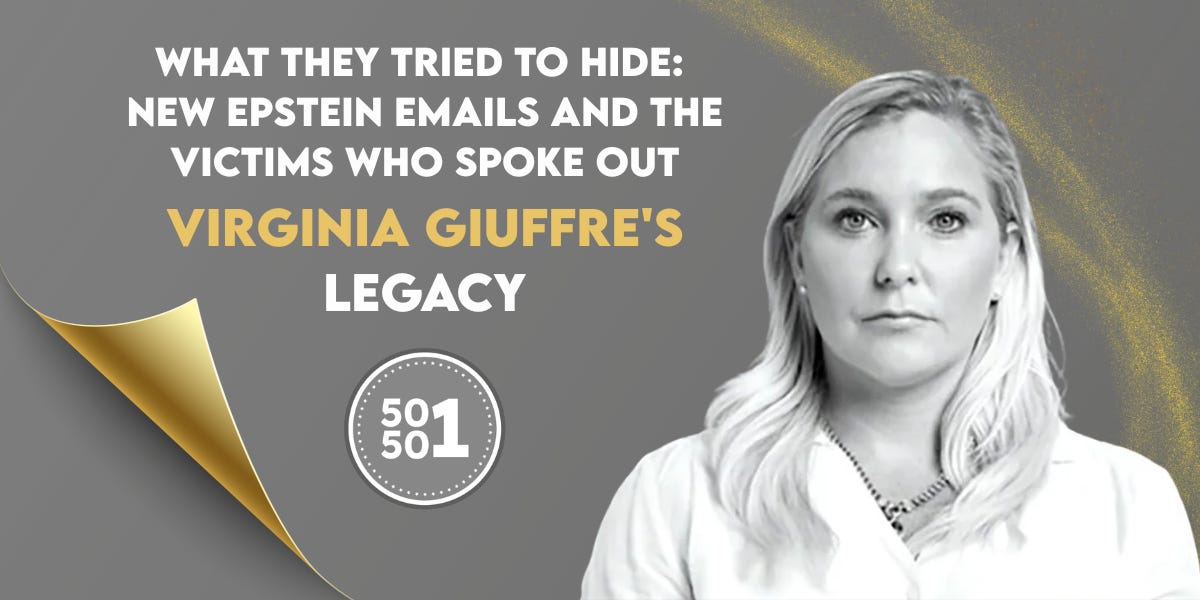
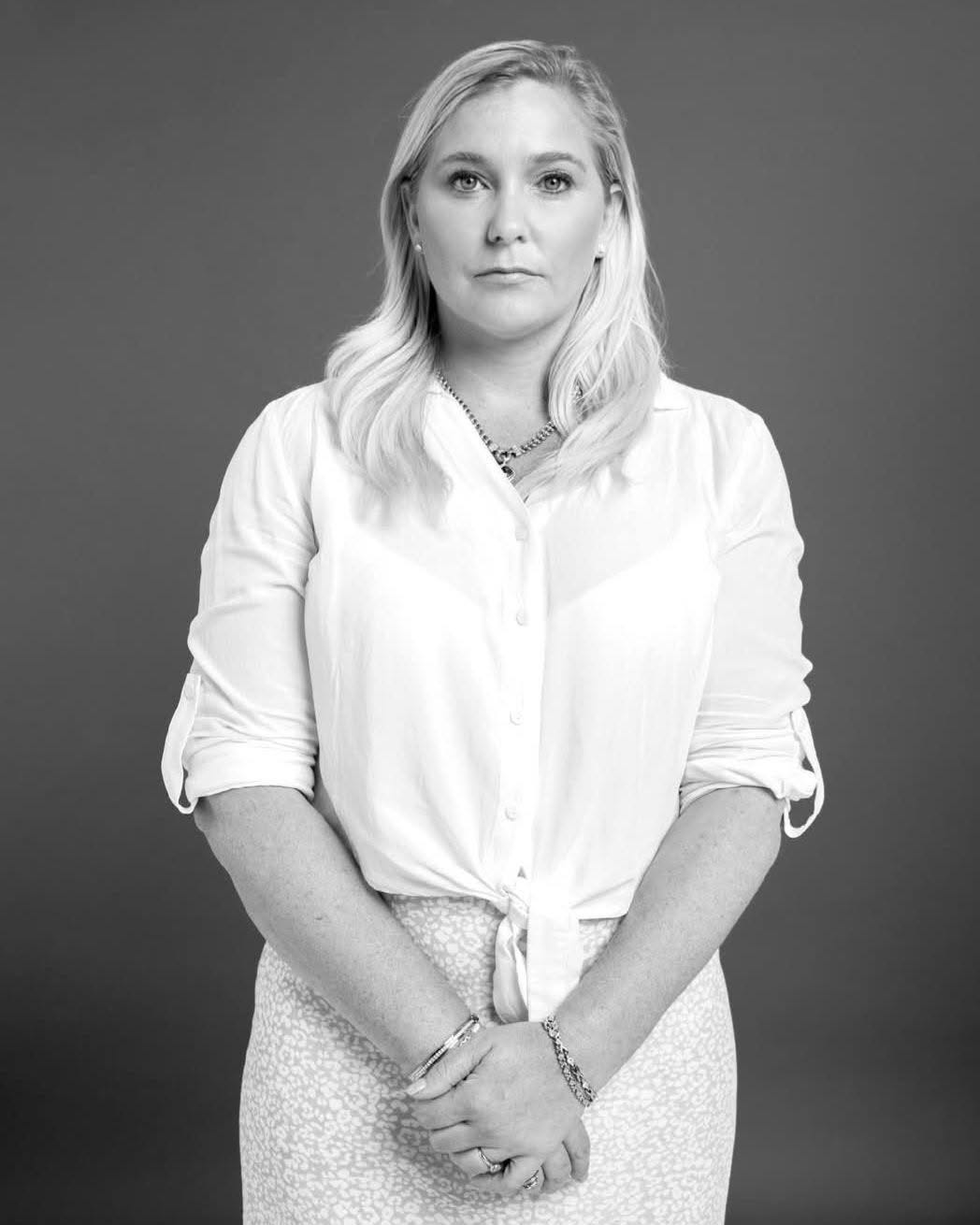
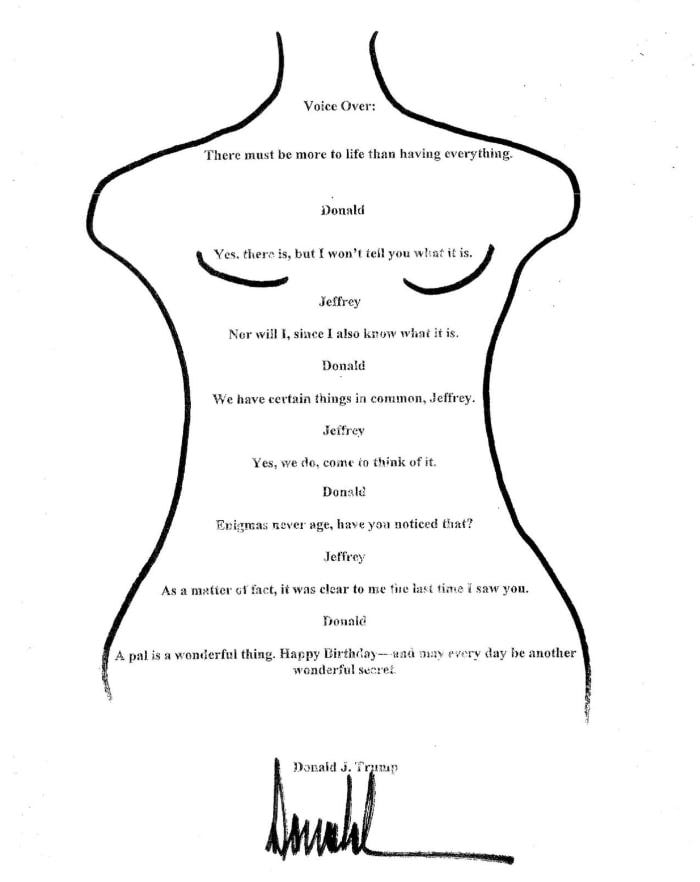
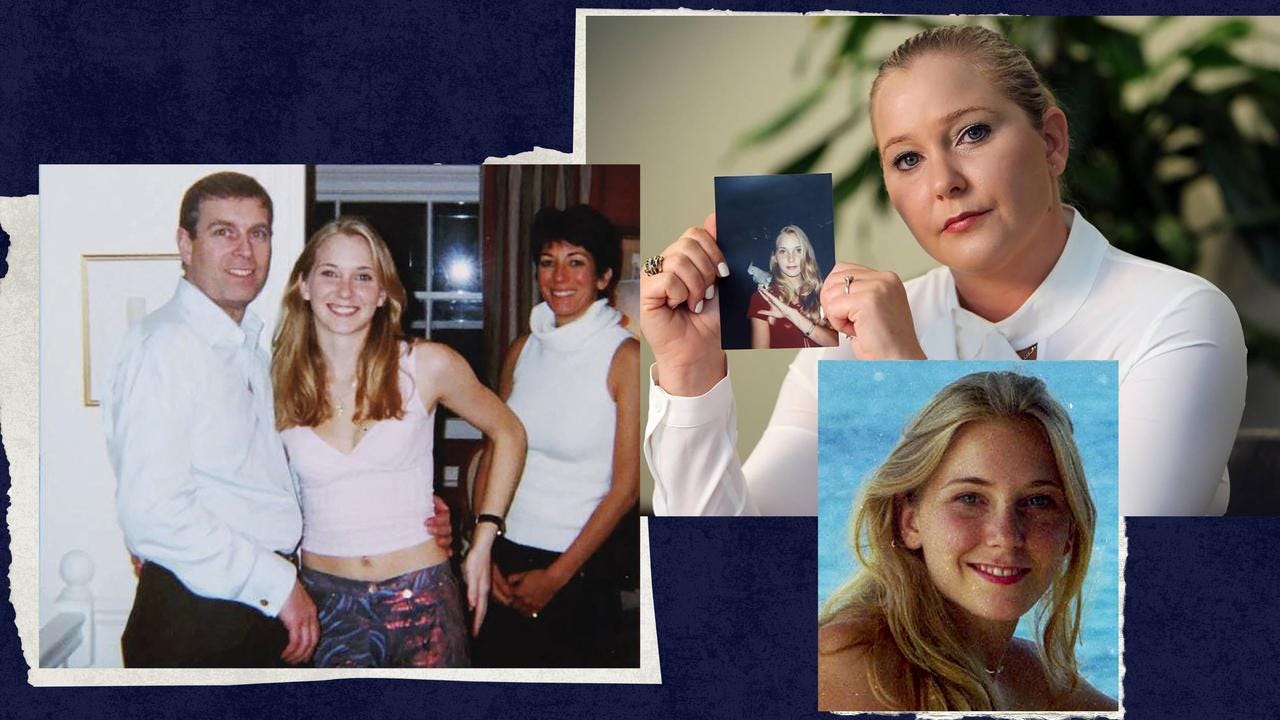
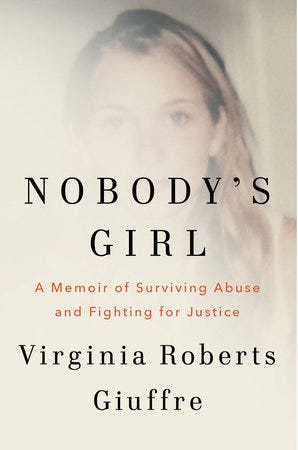

I don’t believe Jeffery Epstein committed suicide either. I think that people with a lot of money and power are going to try to keep from having their crimes exposed and can/will silence witnesses any way they need to.
Victims generally don't lie about their abuse.